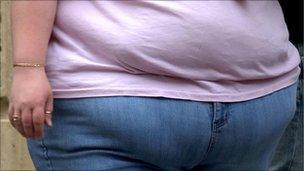Diabetes, diet and obesity
- Published
- comments

Obesity is a major risk factor for Type 2 diabetes
I will never forget my visit to a coffin factory in Mississippi. Sales of over-size caskets were rising fast - no wonder in the US's fattest state. Some of the coffins were three feet (1m) wide - on the inside.
I heard dire warnings from doctors about obesity-related health problems, especially Type 2 diabetes. One warned me that if the upward trend in diabetes continued, it would eventually bankrupt the state health budget.
But the problem was not confined to the US. The dramatic increase in obesity-related Type 2 diabetes is one of the most serious global health problems.
In the UK, 2.5 million people have Type 2 diabetes, which can cause long-term damage to many parts of the body and shorten life.
Cardiovascular disease, blindness and amputation are among the serious complications associated with the condition.
Drastic
Type 2 diabetes occurs when there is too much glucose in the blood - either because of insufficient insulin production in the pancreas - or cells becoming insulin-resistant.
Drastic weight loss and stomach surgery have both been shown capable of reversing the condition. A healthy lifestyle is especially important for managing the condition.
Low calorie
A new study, in the journal Diabetologia, external, has shown that an extreme low calorie diet can rapidly reverse Type 2 diabetes. Eleven people with diabetes followed an eight week diet of 600 calories a day.
The study, led by a team at Newcastle University, showed that after just one week of drastic dieting, the pre-breakfast blood sugar levels of all 11 participants had returned to normal.
Insulin
MRI scans revealed that fat levels in the pancreas fell, normalising insulin production.
The Newcastle team said their research showed the disease did not need to be a life sentence.
The study was small - just 11 participants. After 18 months, four of them were still free of diabetes. Much bigger and longer studies would be needed to see how useful this technique could be.
As with other research, the bigger the number of participants, the more robust the findings. I am also unsure how many people could stick to a 600 calories a day diet.
Dr Ee Lin Lim, one of the authors of the study paid tribute to those who took part: "The participants were highly motivated and dedicated. They also had very supportive families".
Diabetes UK which funded the research said such a drastic diet was not "an easy fix" and should only be undertaken with medical supervision.
- Published24 June 2011
- Published13 April 2011
- Published25 October 2010